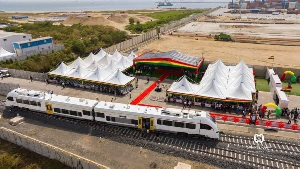Accra, Aug. 11, GNA - Social Watch Report 2004, an international citizens progress report on poverty eradication and gender equity, was on Wednesday launched in Accra with a call on the Government to critically look at policy making, land tenure and crime.
Professor Kwame Karikari, of the School of Communication Studies, University of Ghana, launched the Report, which has the theme: "Fear And Want: Obstacle to Human Security."
It is based on the unprecedented threats posed by development and political process to human security.
The 230-page Report is a compilation of national reports that address selected themes based on the goals and commitments that governments have made and is published by Ghana Social Watch Coalition, a group of nongovernmental organisations (NGOs) that looks at human security as contained in the international covenant on the economic social, cultural rights.
Prof. Karikari said actions to protect political power and state security had undermined people's safety from violent and non-violent threats across the world.
He said past Ghana Social Watch Reports on education, health and poverty highlighted the growing poverty and inequalities in access to social services resulting from years of neo-liberal economic reforms. More recent studies attested to the exacerbation of the threats, Prof. Karikari said.
He said a survey conducted by the Ghana Centre for Democratic Development in 2002 showed that two-thirds of Ghanaians faced permanent economic uncertainty.
Prof. Karikari said in rural areas where the majority of the poor lived, the generalised economic insecurity in the country had an important specific dimension - growing landlessness and insecurity of tenure.
Those with least status, knowledge or means were the least well served.
"Loss of rights is widely occurring and given the centrality of secure access to the social and economic fabric of society, instability threatens and, in some parts of the country, has already spilled over into violence," he said.
He said the policing response to crime in the country of late had two worrying dimensions, heavily targeting the poor on the one hand and entrenching a role for the military in policing on the other hand.
"This contributes to assault type policing methods and growing militarisation of Ghanaian policing.
"Yet because of the public anxiety about the wave of violent crime there is very little discussion either of the human rights issues raised by Police methods or of the issues of the possible links between economic liberalisation, economic insecurity and the upsurge in crime," he said
He said the insatiable demand and extraction of minerals and other natural resources such as timber had caused and continued to cause so much insecurity in places like Iraq, Nigeria, Angola, Palestine, Democratic Republic of Congo, Liberia and Ghana.
The Report noted that in the name of economic liberalisation, the State was ready to use Police and the Military forces to coerce mining and forest communities to vacate their natural resources for companies. Their labour rights are being trampled upon.
It noted that the promoters of such development paradigms had themselves raised concern at the frightening neglect of human security for national security.
It quoted Mr James Wolfensohn, World Bank President, as saying: "We are doing about 50 billion dollars for development expenditures and 1,000 billion for military expenditure and I find that out of balance." The displaced citizens end up in the big cities looking for un-existing jobs, they live in dehumanising conditions and are targets for Police brutalities, he said.
Regional News of Wednesday, 11 August 2004
Source: GNA
Govt urged to look at policy making, land tenure, crime
Entertainment















